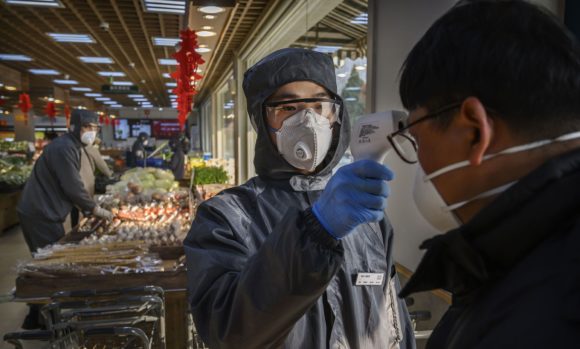At the direction of the Chinese government, domestic insurers started selling business interruption insurance to cover Chinese enterprises against disruptions from the coronavirus outbreak, which may have unintended consequences.
Fitch Ratings cautions that the move could pose risks to the underwriting stability of property and casualty insurers.
Not only is there is limited reliable and accurate historical data points, which makes it difficult for insurers to be able to price the products accurately, at adequate levels, but these products also are being brought very quickly to the market, Fitch explained.
The policies are aimed at supporting the resumption of production and work within the Chinese economy after a lockdown to contain the spread of the coronavirus, said Fitch in a market commentary issued on April 16, titled “Business Interruption Insurance Poses New Risks to Chinese Insurers.”
The pricing adequacy of these so-called return-to-work (RTW) insurance products remains highly uncertain as the pandemic is still developing domestically and globally, the ratings agency said.
However, the approach used to design or sell these products may limit the overall insured losses that the sector needs to absorb, the commentary continued.
“There are maximum limits that each insured enterprise can claim if the infection occurs after employees return to work,” Fitch said.
In addition, the products offered in some regions impose a cap on the maximum number of insured policies that insurers can offer, which will limit their overall risk exposure, and therefore will be unlikely to cause material systemic risks to the non-life insurance sector.
According to figures from China’s banking and insurance regulator, 68 Chinese insurers have introduced coronavirus-related products since the start of the outbreak in late 2019, Fitch confirmed.
“The features of the insurance vary by product and region, but they mainly provide coverage against two kinds of risks – liability for an employee’s illness and death, and risks related to business interruption associated with property shutdowns due to infection,” the ratings agency continued.
Fitch explained that the insurance mainly covers quarantine costs, staff salaries, housing rental, cash flow disruptions and refinancing difficulties caused by the coronavirus shutdown. “RTW insurance products are largely offered to industries or sectors that the local governments have prioritized for aid.”
Not all entities are automatically eligible for the RTW coverage because approval from the authorities is necessary for some insurance schemes, Fitch said, noting that some of the products also impose limits on the duration of coverage.
Insurers typically underwrite RTW insurance products through co-insurance by sharing risks with a portfolio of domestic non-life insurers. Some schemes also specify a ceiling on the amount that an individual insurer needs to pay.
Pre-Crisis Business Interruption Market
The majority of Chinese businesses did not buy business-interruption insurance before the outbreak when they purchased commercial property insurance, partially due to capacity availability and affordability issues, Fitch went on to say.
These products also generally contained an exclusion clause for epidemics, which means that coronavirus-related claims will not be significant for Chinese property and casualty insurers on these earlier policies, the commentary said.
The Insurance Association of China said claim payments related to COVID-19 amounted to CNY123 million (US$17.4 million) as of April 10, 2020. Business from commercial properties only contributed about 3.6% of total non-life insurance premiums in 2019.
Fitch predicted the demand for RTW insurance products will continue in the short term as the coronavirus outbreak is still ongoing.
The majority of these RTW insurance products or schemes are initiated by municipal or provincial governments, which subsidize a material portion of the premiums to enhance the affordability of these products, said Fitch, noting that the subsidies range from 50% to 70% of the premiums paid to insurers when businesses voluntarily buy the RTW insurance products.
Source: Fitch
Photograph: A Chinese worker checks the temperature of a customer as he wears a protective suit and mask at a supermarket in Beijing on Feb. 11, 2020. Photographer: Kevin Frayer/Getty Images.
Related:
- Suddenly There Is Big Demand for Pandemic Cover, Says Underwriter
- Wimbledon Shows How Pandemic Insurance Could Become Vital for Sports, Other Events
- Thai Insurer’s Coronavirus Cover Draws ‘Overwhelming’ Demand
- This Insurance Would Have Helped in Coronavirus Crisis But Nobody Bought It
- AM Best Warns Losses Could Be Big for P/C Insurers Writing Event Cancellation Business
- Insurers Face Big Investment Losses, Trade Credit Claims from Coronavirus Crisis
Was this article valuable?
Here are more articles you may enjoy.



 Preparing for an AI Native Future
Preparing for an AI Native Future  State Farm Adjuster’s Opinion Does Not Override Policy Exclusion in MS Sewage Backup
State Farm Adjuster’s Opinion Does Not Override Policy Exclusion in MS Sewage Backup  Judge Tosses Buffalo Wild Wings Lawsuit That Has ‘No Meat on Its Bones’
Judge Tosses Buffalo Wild Wings Lawsuit That Has ‘No Meat on Its Bones’  Experian Launches Insurance Marketplace App on ChatGPT
Experian Launches Insurance Marketplace App on ChatGPT 

